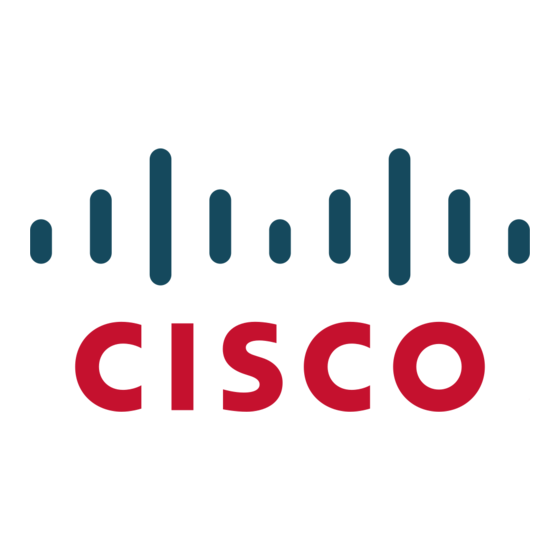Cisco 7600 Series Frequently Asked Questions - Page 4
Browse online or download pdf Frequently Asked Questions for Network Hardware Cisco 7600 Series. Cisco 7600 Series 5 pages. Cisco 7609: frequently asked questions
Also for Cisco 7600 Series: User Manual (14 pages)

The second hardware-accelerated forwarding path is the PXF processing complex located on each line card. Each
PFX complex is capable of forwarding traffic at up to 6 Mpps. Depending on the interface of the specific card, there
may be up to two PXF processors on any single line card.
Features supported by this complex include Layer 2 virtual private networks (VPNs), more commonly known as Any
Transport over MPLS (AToM), Layer 3 Multiprotocol Label Switching (MPLS) VPNs (RFC 2547-compliant) as well
as quality of service (QoS) features like Class-Based Weighted Fair Queuing (CBWFQ), Low Latency Queuing (LLQ),
Weighted Random Early Detection (WRED), and Traffic Shaping.
Q. Is a DPT or resilient packet ring (RPR) solution available on the Cisco 7600 Series?
A. An OC-48/STM-16 POS/DPT OSM is available. The OSM provides either two ports of OC-48/STM-16 POS or
a single OC-48/STM-16 DPT node on the same card, along with four ports of Gigabit Ethernet. In addition, POS-
or DPT-mode configurations are software-selectable.
Q. Does the Cisco 7600 Series have feature parity with the Cisco 7500 Series?
A. Today, the Cisco 7600 Series supports the majority of critical features found on the Cisco 7500 Series, including
support for Cisco 7500 Series port adapters. More advanced QoS and high-availability features will be supported in
upcoming hardware and software enhancements.
Q. What MPLS functions are available on the Cisco 7600 Series?
A. The Cisco 7600 Series supports Ethernet over MPLS, Basic MPLS (with Label Edge Router [LER] and Label
Switch Router [LSR] capabilities), and MPLS VPNs. MPLS features require OSMs and/or FlexWAN modules until
the next-generation forwarding engine is available in the 2003 calendar year. At that time MPLS will be supported
natively in the hardware forwarding ASICs and will not require interface restrictions, thereby making the Cisco 7600
Series an even more cost-effective solution.
Q. What is Ethernet over MPLS (EoMPLS) on the Cisco 7600 Series?
A. Ethernet over MPLS is Layer 2 transport of Ethernet frames across an MPLS core. This is an implementation of
the IETF "draft-martini-l2circuit-trans-mpls-10" for the transport of Ethernet frames.
This capability is a subset of a complete suite of Layer 2 transport mechanisms often referred to as "Any Transport
over MPLS" (AToM). Currently, both VLAN mode and port mode (VC types 4 and 5) are supported on the Cisco
7600 Series.
The following URL details the capabilities of this feature:
http://www.ietf.org/internet-drafts/draft-martini-l2circuit-trans-mpls.txt
Q. Is IPv6 supported on the Cisco 7600 Series?
A. The Cisco 7600 Series will support hardware-accelerated IPv6 in calendar year 2003 with the introduction of the
next-generation forwarding engine for the Cisco 7600 Series.
Q. Is automatic protection switching (APS) supported on the POS OSMs for the Cisco 7600 Series?
A. Yes, SONET 1+1 APS is supported on all POS OSMs, including OC-3/STM-1, OC-12/STM-4, and OC-48/
STM-16. Supported configurations include APS between ports on a single line card, between ports on different line
cards in the same chassis, and between ports in different chassis. APS is not yet supported on the OC-12 ATM
line card.
Cisco Systems, Inc.
All contents are Copyright © 1992–2003 Cisco Systems, Inc. All rights reserved. Important Notices and Privacy Statement.
Page 4 of 5
